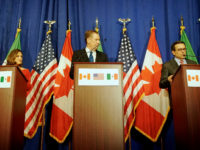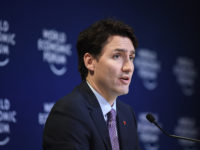The U.S. released its annual piracy watch list last week, elevating Canada to the priority watch list alongside countries such as China and Russia. If that sounds implausible, that’s because it is. The U.S. has long used its annual report on IP issues to exert pressure on other countries and this year is no different. Indeed, with the IP chapter still unresolved in the NAFTA negotiations, the decision to elevate Canada appears to be an obvious effort to place negotiators on the defensive. In doing so, the U.S. has further undermined the credibility of a review process that is widely recognized as little more than a lobbying exercise.
Post Tagged with: "nafta"
Data Rules in Modern Trade Agreements: The Video
Earlier this month, CIGI posted my essay contribution to its series on data governance in the digital age. Data Rules in Modern Trade Agreements: Toward Reconciling an Open Internet with Privacy and Security Safeguards focuses on the policy challenges associated with including data provisions in trade agreements such as the TPP and NAFTA. I also sat down with CIGI for a short video on the essay. It is embedded below.
Data Rules in Modern Trade Agreements: Toward Reconciling an Open Internet with Privacy and Security Safeguards
CIGI’s essay series on data governance in the digital age has shone a spotlight on the need for a national data strategy. My contribution notes that central to any data strategy will be some measure of data control. Given the implications for privacy, security and innovation policies, this includes some control over where data is stored and the conditions under which it is transferred across borders. Yet, despite the mounting data concerns, Canada may have already signed away much of its policy flexibility with respect to rules on both data localization and data transfers, severely restricting its ability to implement policy measures in the national interest.
Don’t Make the TPP Mistake Again: Why Canada Needs to Maintain a Progressive Approach on IP in NAFTA
The intellectual property chapter has not been a focal point of the NAFTA negotiations this week in Montreal, but the successful conclusion of the TPP11 (or CPTPP) serves as a reminder that it is likely to emerge as a contentious issue in the months ahead. The U.S. position on the NAFTA IP chapter is clear: it wants to replicate the original TPP IP chapter. Yet Canada now stands opposed to that chapter having backed the suspension of many of its provisions including copyright term extension, digital locks, notice-and-takedown, patent protections, biologics protections, and pharmaceutical plan rules. In fact, Prime Minister Justin Trudeau this week cited changes to the IP provisions as one example of how the government worked to make the TPP more progressive.
NAFTA Offers Chance for Much-Needed Internet Safe Harbour Rules in Canada
The NAFTA negotiations resume in Montreal this week with Internet liability emerging as an increasingly contentious issue. I was pleased to be part of a group of 55 Internet law experts and organizations that recently urged negotiators to include Internet safe harbour rules that promote freedom of expression in the agreement. The provision, which is already found in U.S. law, would lower barriers to startup online companies, advance free speech, and protect sites publishing consumer reviews.











